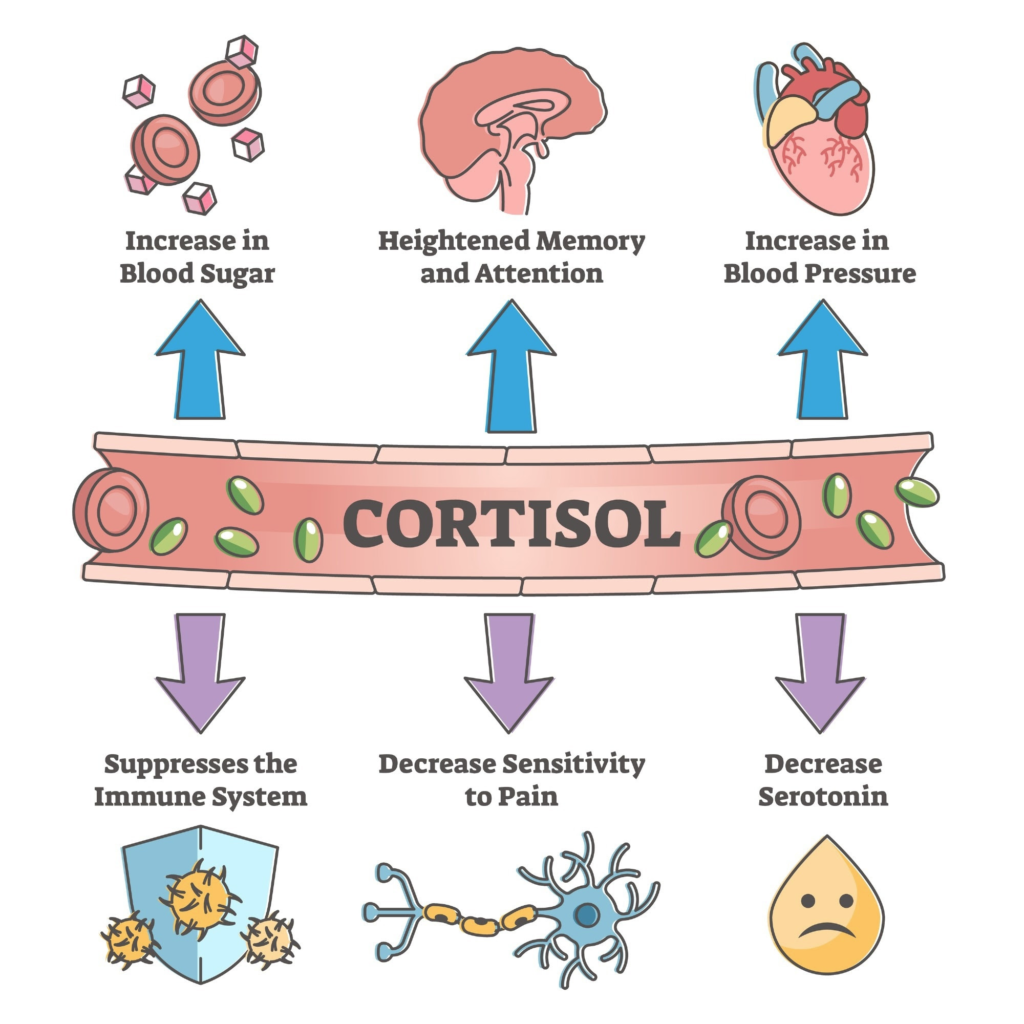By Marzia Khan
Reviewed by Danielle Ellis, B.Sc.
Biological functions of cortisol
Effects of cortisol on different systems
Cortisol imbalance and health issues
Managing cortisol levels
Conclusion
References
Further reading
Cortisol is commonly known as the body’s stress hormone and has a range of effects on various functions within the body.

Image Credit: GoodStudio/Shutterstock.com
This glucocorticoid is a steroid hormone that is created from cholesterol and is released from the adrenal cortex within the zona fasciculata layer. The hypothalamus-pituitary-adrenal (HPA) axis works to regulate the production and secretion of cortisol.
Most glucocorticoids circulate the body in their inactive form, bound to either corticosteroid-binding globulin (CBG) or albumin.
The enzyme 11-beta-hydroxysteroid dehydrogenase 1 (11-beta-HSD1) converts these inactive glucocorticoids to their active form in most tissues, while 11-beta-HSD2 converts the active form of cortisol back into its inactive form, cortisone, in the kidney and pancreas.
Biological functions of cortisol
Cortisol has various functions within the body including mediating the stress response.
With many internal and external stressors, the body processes these and responds appropriately depending on the level of stress.
The autonomic nervous system can be categorized into the sympathetic nervous system (SNS) and the parasympathetic nervous system (PNS). The sympathetic nervous system triggers the ‘fight or flight’ response associated with stress, leading to a cascade of hormonal and physiological reactions.
When the body is under stress, the SNS is activated by the hypothalamus after receiving a stress signal from the amygdala, which is the part of the brain that processes fear, arousal, and emotional stimuli. The activation of the SNS leads to the release of catecholamines, such as epinephrine, from the adrenal glands. This subsequently increases heart rate and respiratory rate.
Additionally, with continued stress, the hypothalamus activates the HPA axis, leading to the release of cortisol from the adrenal cortex, and this enables the body to stay on high alert.

Image Credit: Zerbor/Shutterstock.com
Interestingly, cortisol and metabolism are also connected, with the stress hormone helping to regulate glucose metabolism through increasing gluconeogenesis and insulin resistance, which ensures there is sufficient energy supply during a stress response.2
Cortisol and the immune system also have an interesting connection with the SNS and the HPA axis working together to release norepinephrine by upregulating the transcription of proinflammatory immune response genes, such as IL-1, IL-6, and TNF.
When chronic stress leads to glucocorticoid resistance, immune cells become less sensitive to glucocorticoids. This resistance alters the fight or flight response to social threats, leading to exaggerated inflammation and a proinflammatory state.
Cortisol’s effects on the body also impact the cardiovascular system through the regulation of blood pressure and vascular tone. The hormone works by enhancing vasoconstriction and increasing cardiac output, which contributes to the fight or flight response when experiencing acute stress.
Cortisol | cortisol’s effects on body | cortisol: the stress hormone | cortisol as immunosuppressant
Effects of cortisol on different systems
Chronic stress can cause negative effects over time due to a mechanism of prolonged cortisol release, which causes desensitization of the HPA axis over time.
An underlying mechanism that causes this has been hypothesized to be associated with the constant glucocorticoid release that depresses the HPA axis response over time, resulting in HPA axis dysregulation and cortisol resistance.
This dysregulation that occurs with chronic stress is associated with various diseases, such as Alzheimer’s disease and Parkinson’s disease, along with neuroinflammation in the central nervous system.
Interestingly, even small changes to the body’s system during chronic stress can affect the functional output of many cells and tissues, which can cause alterations in metabolic processes and affect behavior, mood, and cognitive function.
Additionally, cortisol can also affect memory. In one study using mice models of Alzheimer’s disease, increased stress and glucocorticoid production were observed to worsen cognitive and memory deficits. This increase in stress also boosted the production of beta-amyloid, a distinctive feature of the neurodegenerative disease.
The Impact of Hormones on the Nervous System
Chronic stress characterized by chronically elevated cortisol can also cause digestive dysfunction, such as elevated intestinal permeability, impaired absorption of micronutrients, and abdominal discomfort.3 Inflammation of the CNS may contribute to symptoms of depression with proinflammatory cytokine levels that cause loss of appetite.
Cortisol also impacts the musculoskeletal system, with the stress hormone upregulating the RANK ligand and osteoprotegerin (OPG) expressions in osteoblasts, which mediates the bone remodeling process. Glucocorticoids such as cortisol can cause negative bone turnover, which subsequently results in bone loss.
Increased cortisol levels as a response to chronic pain can also contribute to muscle tension and inflammation, which can contribute to the chronic pain cycle
Human reproductive function was also reported to be affected by cortisol through immunosuppression. A meta-analysis found that 7 out of 11 studies that compared cortisol levels between fertile and infertile participants had significantly higher levels of cortisol in the infertile group.
Cortisol imbalance and health issues
Cortisol imbalance can greatly impact health; high levels of circulating cortisol can cause conditions such as Cushing’s syndrome, with symptoms including weight gain in the face and chest, skin changes, mood swings, osteoporosis as well as high blood pressure. Excess glucocorticoids can also lead to the development of diabetes mellitus.

Image Credit: VectorMine/Shutterstock.com
Additionally, cortisol imbalance with low levels of cortisol can also lead to serious autoimmune diseases such as Addison’s disease, which results in damage to the adrenal glands. Addison’s disease can develop quite slowly, and this can cause a slow and challenging diagnosis, with symptoms that include fatigue, weight, and muscle loss, mood swings as well as skin changes.
Managing cortisol levels
With stress being a significant health concern, managing cortisol levels is an important component of reducing stress.
There are three ways to regulate cortisol levels, including lifestyle changes, diet and the use of supplements.
Lifestyle changes include exercise, consistent sleep, and being outdoors, all of which aid in reducing cortisol levels. Studies have shown exercise to be a contributor to decreased cortisol levels, especially with age. Sleep deprivation has also been connected to increased cortisol levels, and increasing sleep has been shown to decrease cortisol levels.
A recent meta-analysis found that meditation interventions have been effective at decreasing cortisol levels. However, this was only the case in high-stress samples that assessed cortisol levels in the blood.
Managing a diet with nutrition-rich foods that have inflammatory properties can calm the body as well as slow cortisol production; this includes magnesium-rich foods such as avocados, foods rich in omega-3 fatty acids such as fish, and gut-friendly foods such as Greek yogurt.
Supplements such as ashwagandha, rhodiola, lemon balm, and chamomile have also been shown by research to maintain cortisol levels within a healthy range.
Medical treatments for patients with Cushing’s syndrome are designed to lower cortisol levels in the body if the cause is due to taking glucocorticoid medication for a long time. Reducing medication can be used to manage cortisol levels. However, stopping medication too quickly can leave too little cortisol in the body.
Conclusion
Cortisol is a stress hormone that can activate the fight or flight response when the body experiences a perceived threat. Proper balance and management of cortisol are essential, as both excessive and insufficient levels can negatively impact the body and are linked to various diseases.1,2,6
Being aware of how stress affects the body and managing it appropriately can aid in increasing quality of life, with cortisol and health being closely interconnected; further research into how to decrease stress is significant for overall health.
References
Thau L, Gandhi J, Sharma S. Physiology, cortisol. National Library of Medicine. Published August 28, 2023. https://www.ncbi.nlm.nih.gov/books/NBK538239/
Knezevic E, Katarina Nenic, Milanovic V, Nebojsa Nick Knezevic. The Role of Cortisol in Chronic Stress, Neurodegenerative Diseases, and Psychological Disorders. Cells. 2023;12(23):2726-2726. doi: https://doi.org/10.3390/cells12232726
Cherpak CE. Mindful eating: A review of how the stress-digestion-mindfulness triad may modulate and improve gastrointestinal and digestive function. Integrative Medicine: A Clinician’s Journal. 2019;18(4):48-53. Available at: https://www.ncbi.nlm.nih.gov/pmc/articles/PMC7219460/
Ng JS, Chin KY. Potential mechanisms linking psychological stress to bone health. International Journal of Medical Sciences. 2021;18(3):604-614. doi:https://doi.org/10.7150/ijms.50680
Bheena Vyshali Karunyam, Karim A, Isa Naina Mohamed, et al. Infertility and cortisol: a systematic review. Frontiers in Endocrinology. 2023;14. doi:https://doi.org/10.3389/fendo.2023.1147306
Jones C, Gwenin C. Cortisol level dysregulation and its prevalence—Is it nature’s alarm clock? Physiological Reports. 2020;8(24). doi:https://doi.org/10.14814/phy2.14644
Rogerson O, Wilding S, Prudenzi A, O’Connor DB. Effectiveness of stress management interventions to change cortisol levels: a systematic review and meta-analysis. Psychoneuroendocrinology. 2023;159(159):106415-106415. doi:https://doi.org/10.1016/j.psyneuen.2023.106415
How to Reduce Cortisol and Turn Down the Dial on Stress. Cleveland Clinic. https://health.clevelandclinic.org/how-to-reduce-cortisol-and-turn-down-the-dial-on-stress
Mayo Clinic. Cushing syndrome – Diagnosis and treatment. Mayoclinic.org. Published April 30, 2021. https://www.mayoclinic.org/diseases-conditions/cushing-syndrome/diagnosis-treatment/drc-20351314

Leave a Reply